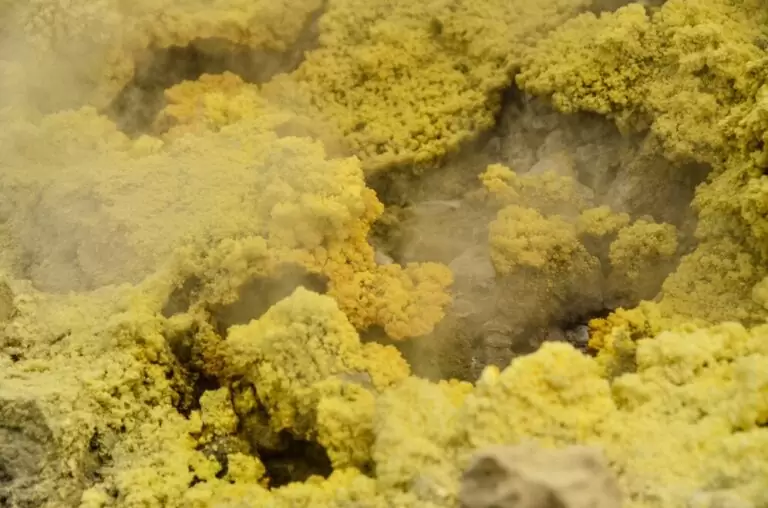Sulfur is an essential element that has been naturally depleted in soils over recent decades due to erosion, leaching, and the loss of organic matter. A deficiency of sulfur not only hinders plant growth but also reduces the absorption efficiency of other nutrients.
Among available solutions, granular sulfur has emerged as a scientific, sustainable, and effective soil amendment fertilizer. In this article from Petro Sepidar Sadr, we explore its production, functions, and agricultural benefits in detail.
Method of Producing Granular Sulfur
Granular sulfur is a refined by-product of the petroleum industry that, when combined with specific additives, transforms into a form absorbable by plants and usable in multiple industrial applications.
The sulfur used in production is typically obtained during crude oil and natural gas refining, extracted as a by-product of the desulfurization process aimed at reducing environmental pollution.
After extraction, raw sulfur is melted, purified, and mixed with materials such as bentonite to create solid, stable granules. This structure enhances stability and practicality for both agricultural and industrial uses.
What Is Granular Sulfur Fertilizer?
Granular sulfur fertilizer consists of compressed granules of elemental sulfur mixed with bentonite or other swelling agents.
When exposed to soil moisture, it swells and breaks down gradually, releasing sulfur particles that the roots can absorb over time.
Typical composition:
- 75% to 90% elemental sulfur
- 10% to 25% bentonite
Thanks to its form, this fertilizer is easy to transport, store, and spread evenly, and is also resistant to wind or washout, outperforming powdered sulfur types.
Difference Between Granular, Powdered, and Liquid Sulfur
Powdered Sulfur
Reacts quickly in soil but due to its light weight and high dispersion, it can easily be lost through wind or rain. It oxidizes rapidly, increasing the risk of early sulfur loss before plant absorption.
Liquid Sulfur
Mainly used for foliar spray applications; it provides quick but short-lived results and offers limited root absorption.
Granular Sulfur
Provides a slow and controlled release, ensuring plants receive a steady supply of sulfur. It is particularly effective for long-term pH correction and soil structure improvement, especially in alkaline and calcareous soils.
How Granular Sulfur Works in the Soil
When applied, granular sulfur swells upon contact with soil moisture, and the bentonite component enables its gradual breakdown.
Through microbial activity—particularly from Thiobacillus bacteria—elemental sulfur is converted into sulfate, the plant-absorbable form.
The bentonite retains moisture, boosts oxidation uniformity, and ensures slow, consistent release. This not only enhances efficiency but also prevents nutrient leaching losses.
Key Benefits of Granular Sulfur in Agriculture
Amends Alkaline and Calcareous Soils
Granular sulfur effectively lowers soil pH, converting sulfur into sulfuric acid which induces localized acidity, improving nutrient uptake—especially in calcareous and saline soils.
Increases Nutrient Availability
Sulfur enhances the availability of elements such as nitrogen, phosphorus, potassium, iron, manganese, and zinc. By reducing pH, these nutrients transform into soluble, plant-accessible forms, reducing deficiency symptoms.
Improves Soil Structure
The bentonite in granular sulfur increases porosity and aeration, improves water retention, and supports biological activity—beneficial especially in dry regions or heavy-textured soils.
Enhances Plant Growth and Crop Quality
Gradual sulfur release ensures stronger root systems, faster growth, and improved quality in crops such as grains, oilseeds, garlic, onions, and radishes—plants highly dependent on sulfur for flavor and aroma.
Antifungal and Disinfectant Effects
Sulfur generates an acidic and antifungal soil environment, helping control fungal diseases (e.g., powdery mildew) and reducing reliance on chemical fungicides or pesticides.
Stimulates Beneficial Microbial Activity
The bentonite matrix and elemental sulfur provide an ideal medium for beneficial soil microorganisms. These microbes accelerate organic matter breakdown, enhance soil fertility, and convert sulfur into plant-absorbable sulfates.
How to Apply Granular Sulfur
Proper application time and method are key to maximizing results.
Optimal Timing
- Late autumn (before planting) or
- Early growing season, when soil microbial activity peaks.
Application Techniques
- Surface spreading
- Banding near root zones (trees)
- Mixing with organic manure
Recommended Dosages
| Crop Type | Application Rate |
|---|---|
| Orchards | 1–3 kg per tree |
| Field crops | 500–1000 kg/ha |
| Greenhouses | 250 g/m² |
For maximum efficiency, soil should be plowed and mixed post-application to enhance nutrient contact and absorption.
Conclusion
In today’s precision agriculture, sulfur is not optional—it is essential.
Bentonite granulated sulfur offers a proven way to stabilize soils, enhance fertility, and boost crop yield sustainably.
Farmers are strongly advised to test the soil before application and consult agricultural experts to determine precise dosages and timings.
By strategically choosing the right sulfur type, you can effectively increase the fertility, output, and long-term sustainability of your land.
This technical content was written in collaboration with Petro Sepidar Sadr, producer and supplier of high-quality petroleum and agricultural-grade sulfur products.






